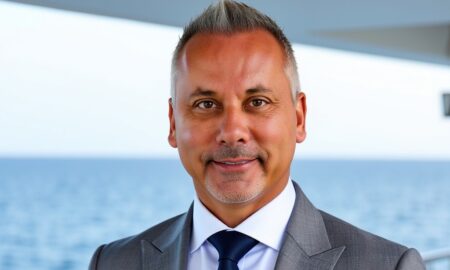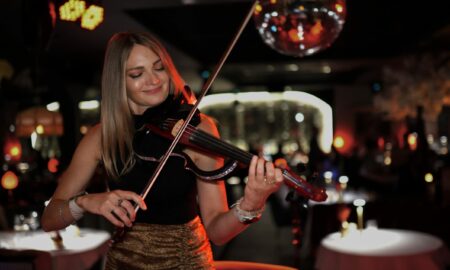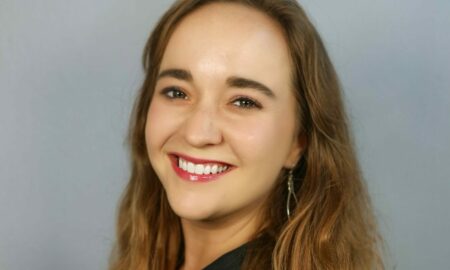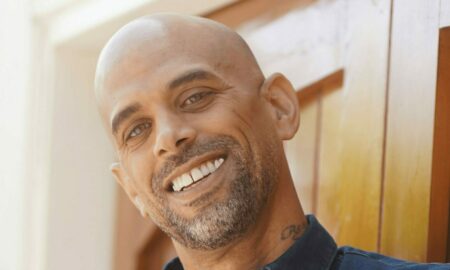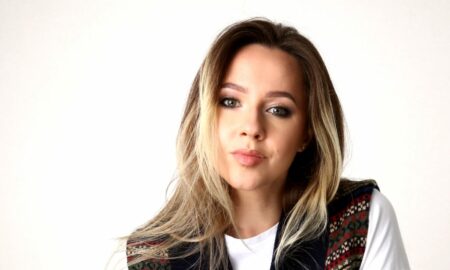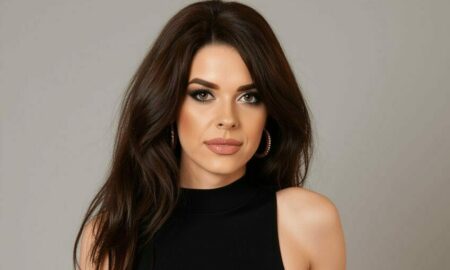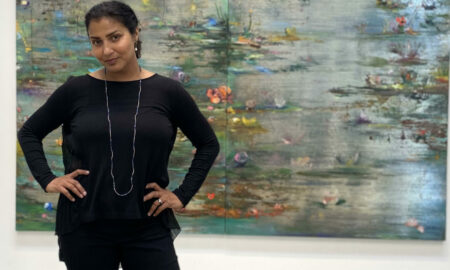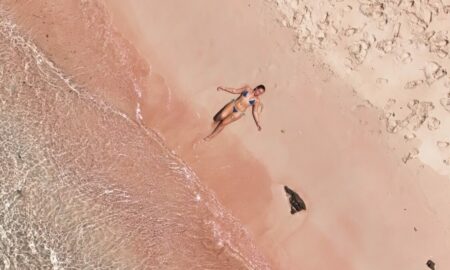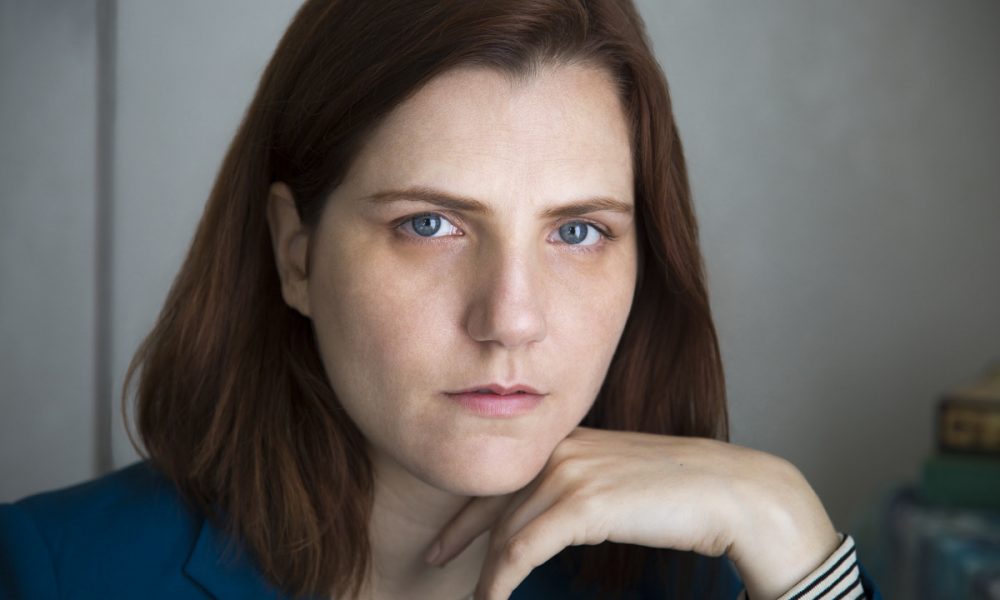

Today we’d like to introduce you to Dalya Guerin.
Thanks for sharing your story with us Dalya. So, let’s start at the beginning and we can move on from there.
I’m a director/screenwriter who will turn 40 next June. I’ll begin my story with the genetic background that I recently received from 23andme. I was born in Paris, but I have family all over the globe: from the Middle East to North America, passing by Europe. My French father was training for priesthood before stepping down for a woman and computer engineering.) My very feminist mother writes poetry and children’s books. She grew up in Aleppo but later moved back to France, her mother country. She is partly Syrian, Turkish, French, Albanese, and Serbian. Maybe that’s why Los Angeles, one of the most cosmopolitan cities in the world, feels like home to me.
When I decided to move here in 2015, I was finally listening to the voice Spielberg talked about in an interview regarding how your dreams manifest themselves. It always whispers, it never shouts. The whispering voice was saying to me, “make movies.” I did my best to ignore this voice for a very long time. At 8, I ignored it when I harassed my mother to translate every Egyptian movie she bought from Arabic to French. At 10, I ignored it when I started to write and perform a show every Sunday for my parents with an original storyline featuring my siblings and myself. At 15, I ignored it, when I directed the Moliere play we were rehearsing with my junior acting troupe. At 16, I ignored it, when I started to binge-watch all the film classics from Bergman to Kurosawa, passing by German expressionism and Italian neo-realism. At 17, I ignored it when I used my first camera to shoot a live-action episode of South Park with unforgettable performances by my siblings (sadly, a lost tape). I will add that even in my romantic relationships with creatives in my adult life, I ignored the whispering voice too often, as well. I was always placing my partners’ artistic needs and aspirations above my own.
I was very much aware of not belonging as a child surrounded by mostly very French children at my very Catholic school in the French countryside. I’ve also never really been able to situate my family in terms of social class, as I have as many relatives who are doctors and attorneys, as well as farmers and workers. Some of these relatives were more or less drawn to the arts, but none of them pursued a creative career. Some artists are born in artistic “dynasties.” That wasn’t my case. I had to make my own way through, and it hasn’t been easy, as I had to let go of a lot of other people’s needs and fears to embrace what sounded right for me.
In my twenties, I did my best to fit in and address my parents’ anxieties concerning my future by pursuing a degree in law and earning a Ph.D. in Political Science. It led me to teach communication and anthropology at a university, and later economics and social sciences at a high school. It wasn’t working for me, as my creative desires were consuming me slowly but surely. Do not get me wrong, I’m grateful for everything I learned during my academic years, but you don’t learn how to grow an artistic heart at school. Artistic knowledge and creative expression are not the same, even though they regularly inform each other.
In my filmmaking journey, I find myself applying unconventional methods learned through my studies about power games, decision-making processes, strategies of communication, and how the connection between technology and ideology intimately prevails in many narrative elements. Cuaron or Innaratu, through their filmmaking, reveal, for instance, how much their shared love for long takes is an exploration of the relationship between subjectivity and reality.
After living for two years in Scotland and London, I got a taste of the kind of freedom you get when you’re not in an environment expecting you to act upon your formal education. Maybe France is not fond of autodidacts or prefers the reassuring nature of its institutions and its schools.
We’re always bombarded by how great it is to pursue your passion, etc – but we’ve spoken with enough people to know that it’s not always easy. Overall, would you say things have been easy for you?
I kept who I was in a closet because I was afraid of upsetting or disappointing the “order” represented by my family and social circle. My Ph.D. supervisor, the late philosopher Lucien Sfez, used to tell me that the free-spirit I was would likely be happier in the U.K. or the U.S. because their societies were more welcoming and supportive of an entrepreneurial and creative mindset like mine. He was right.
The first three years here allowed me to find myself again and to reconnect to the person I was before pursuing years of academic studies. I wrote a lot of screenplays by myself or in collaboration, after reading as many screenwriting books and screenplays as possible. I joined a writing space (Writers Blok in Culver City), two feedback groups, and different organizations to support female filmmakers.
I am not the most outgoing person, but I value very much what work and chosen family bring to my life. The film business mainly works through networking, and you need to find your people in the immense pool of creatives in Los Angeles. Not everyone is meant to work with you, and the opposite is also true. I would add that becoming more YOU has a polarizing effect on your social circle. The people who used to kind-of-like me, love me now dearly, whereas the people who used to dislike me mildly are much more prone to show me their real unkind faces. As for friends, it is essential to nurture these precious relationships in Los Angeles as there is a massive consumerist state of mind of using people and throwing them away when they are not useful to you anymore. Fortunately, I am not prone to the “shark” mentality. But I am still intrigued by people who believe that success goes with treading on other souls who are not trendy enough or influential enough to ease their narcissistic wounds. They usually think that I’m dumb and that my kindness is a weakness. As a writer, that’s fantastic material to shape up some of the characters in my stories. I make movies because I believe our flaws and hopes as human beings can shape riveting stories on the screen. I believe in the power of narratives to move us all and question ourselves.
We’d love to hear more about your work and what you are currently focused on. What else should we know?
I’m an independent filmmaker who actively develops film, music videos, and television projects with the talented creatives I have met in Los Angeles. But I have a particular passion for social justice, women’s rights, and animal causes. I focus mainly on mystery and thriller pieces, but I recently have started to work on a dark comedy project and a dystopia.
My screenplay Air was awarded Best Short Screenplay at the Glendale International Film Festival 2018. Claws Out is the first English-language short film I have made since immigrating to Los Angeles in 2015. It was inspired by how each generation in my family felt a need to break with the traditions of the old generation. Yet, this defiance effectively formed a new tradition in itself. This film is my deeply personal exploration into how people balance change and continuity. It received awards in 2019 and 2020 for Best Director, Best Narrative and Best Actress at various film festivals.
What sets me apart? Definitely my resilience, my kindness and my feminism.
Bashfully but consistently, throughout my twenties I wrote, filmed, and edited whatever was coming my way, from corporate films to music videos, as well as few short films. It wasn’t always easy to navigate between my research/teaching activities and these film projects. Whatever got in the way and knocked me down, I always bounced back stronger and kinder. Because turning bitter would offer a wrong victory to those who are sad enough to belittle and attack you. As my yoga teacher said, grace and elegance are keys in life.
I have also encountered gender bias quite often. I’ve been a feminist since I read the Second Sex by de Beauvoir when I was 18. Being a director, in my personal experience, has been an enriching experience as a feminist. I have faced men AND women questioning my legitimacy as a filmmaker in a way no men with my profile would have been encountered. The domination model is so pervasive that I’ve heard many women vocally question the veracity of all the reported discriminations by the #metoo movement.
At my level, I do my best to bring up every woman I happen to work with. That’s what I’m most proud of in my creative career. I pay much more attention to the struggles of creative women in my social and work circle and particularly to those of women of color. As a white woman in the U.S., my job is to listen more to them, because they have so much to teach me in terms of supporting women’s rights. I was deeply moved by “When they see us,” directed by Ava DuVernay, and she didn’t pick up a camera until she was 32! I’m inspired by the examples of female filmmakers like Alma Har’ el, who moved her way up without the support of an artistic family or a film school. I feel supported by the engagement of actresses like Natalie Portman, evoking the equal right for women to fail. They all pave the way to address many representation issues in the film industry.
What were you like growing up?
I was book smart and not very popular. I would say that hasn’t changed much. You can still count my truest friends on one hand, and I’m perfectly content with that. Again, don’t get me wrong; I’m not a misanthrope. I love people. But people usually care more about exterior signs of wealth or success than I do. They are generally disappointed by the simplicity of my lifestyle.
An anecdote that beautifully sums up how I was as a teenager is from when I was 15. I was very much involved in the junior acting troupe at my school. I had never wished to become an actress, but because I already heard that whispering voice about how much I wanted to direct films, the acting part was the closest I could get to making movies at that time. I already knew that, for me, the most crucial part of a film is the actors’ performance. Like many directors, I think that taking acting classes pays off much more for a director than going to film school.
I was assigned to prepare a scene from a famous Moliere play, l’Ecole des Femmes, in staging it with three characters. I was the youngest in the class and always a bit different from everyone. Nobody picked me. Everyone had their group of three except for me. The teacher said I could be a replacement for any other groups I wish. My feelings were hurt, but I believe it was one of the many moments where I realized that not fitting in the group was an opportunity. It served me to understand that my difference was what fed my creative voice. I realized that them rejecting me was the best gift they could have given me. This lesson appeared throughout my trajectory. It was probably the first time I realized how I thrive in face of rejection because it encourages me to go back to my inner core.
In front of the class, at the auditorium, I ended up doing something no one thought of because no one needed to. I came up with the idea of playing all three parts instead of one. Using props and blocking off where the different characters were standing, I ran between marks to portray each role. When the scene ended, I turned to my class. I was panting. Everyone was standing up and applauding. I was too young to realize what a crucial moment this was in the formation of my creative mindset. Retrospectively, I see how much it taught me about who I am as an artist as a director and a woman.
Contact Info:
- Website: dalyaguerin.com
- Email: [email protected]
- Instagram: @dmg80
- Facebook: https://www.facebook.com/Dalya-Guérin-Film-Director-2167652596660175/
- Twitter: @dalyaguerin
- Other: https://www.imdb.com/name/nm8141816/







 Image Credit:
Image Credit:
©DanielDiScala, ©YvonneVanThueringer, ©DanaZiyasheva, ©NoraFadlaoui
Suggest a story: VoyageLA is built on recommendations from the community; it’s how we uncover hidden gems, so if you or someone you know deserves recognition please let us know here.
Check out the VoyageLA Podcast:
Episode 1 with Content Partner Lisa Taitelman, Founder of Hiking & Wellness company Find Your Trail.












